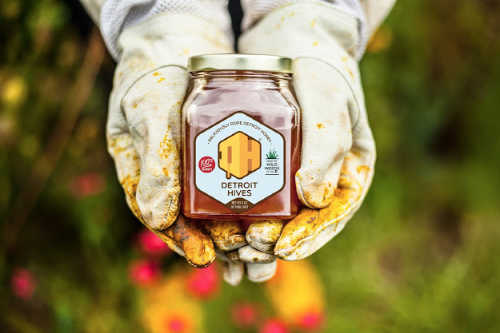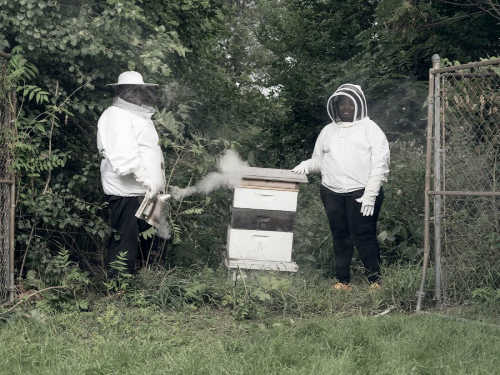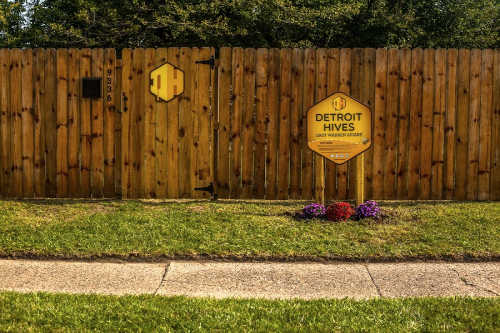Twenty-thousand honey bees exit the hive. One by one, the fuzzy black-and-brown insects crawl out into the daylight then begin to hover over their spade-shaped home. When at least half the hive

has exited, the group takes off into the air together, their jagged flight pattern synchronized, seemingly choreographed.
Watching the bees emerge from the hive, which sits in a nondescript backyard on Detroit’s east side, local beekeeper Timothy “Paule” Jackson adopts a somber, almost mournful, tone as the swarm vanishes into the distance.
The hive had become too crowded, Jackson explains, which forced the bees to raise a new queen bee and — since that hive already had one queen bee of its own — send half the group and its newly crowned monarch off to find a new hive elsewhere.
“What happens is almost like an apocalypse,” says Jackson, explaining the jarring sight of thousands of bees zipping off at once into the city sky. “They have no reason to leave their home unless they outgrow their space or the queen dies.”
In some ways, perhaps, Jackson might be able to relate. The former Wayne State student has spent the past two years nurturing Detroit Hives, a growing non-profit collective of beekeepers and beehives that has become a source of not just raw honey but of nature education, conservation ideals and hope for a city on the rebound.
And not unlike the bees, Detroit Hives, in its short existence, has spread out, establishing hives in more than 30 locations around the city, turning even unlikely locations into hubs of apicultural activity.
Honey Do
And it all started with a cough.
In 2016, Jackson and his partner, Nicole Lindsay, found themselves looking for holistic ways to soothe a persistent cold — and the attendant chronic hacking — that was plaguing Jackson. Most of all, they needed raw honey. After scouring the city proper, however, they were unable to find any. So, after talking it over for a while, the couple took to their backyard in 2017 to begin cultivating their own honey — from scratch.

“We believe that a healthy future for bees reflects a healthy future for humanity,” says Jackson, “The health of those in the inner-city, especially those of color, is often considered last, however, it’s our mission to change this. By transforming vacant lots into urban bee farms, we revitalize neighborhoods.”
These days, Detroit Hives boasts 32 beehives around Detroit, including the group’s first location in the East Warren neighborhood. Jackson and Lindsay say that, thanks to corporate and urban farm partnerships that help sustain their work, Detroit Hives has been able to expand to locations that include Mumford High School, the Ford Resource Center Engagement Center – Eastside (FREC City), Hope Takes Root in Corktown, Peachtree Parks Community Garden in Core City, the Brightmoor Pollinator Habitat, the Beekeeping Co-working Space near Osborn High School, and the Native Bee House in the NW Goldberg Community.
Jackson and Lindsay have also secured corporate partnerships that have increased Detroit Hives engagement through tours and sales. Through their partnership with travel experience brand Airbnb, Detroit Hives is promoted as a “things to do” when tourists visit Detroit. In a partnership with local natural brand Cream Blends, Detroit Hives provides the bee’s wax. In its partnership with Detroit barbeque favorite Slows Bar BQ, Detroit Hives provides the honey for the restaurants’ various sauces.
A Conservationist Calling
At their location, they sell eight-ounce jars of raw natural honey for $20 each. No matter how sweet the sales, though, the pair said they aren’t in business merely to sell products — but rather to focus on the conservation of honeybees.
With honeybees dying en masse all over the world, the result of a pesticide-driven epidemic known as Colony Collapse Disorder, Jackson and Lindsay say promoting bee conservation is critical.
“Honeybees are responsible for one third of our food population,” notes Lindsay. “So if those bees were to completely die out, we’d be next in line.”
Thus, spots like Detroit Hives’ spaces on Detroit’s eastside have become thriving centers for native bee populations, attractive in part because of the wild flowers and other plants that blossom in overgrown vacant lots around the neighborhood. In these surroundings, the bees are able to pollenate without the interfere of chemicals found in pesticides, and Detroit Hives is able to help the bee population grow.

The impact of Detroit Hives goes beyond the bees, though. From May to October, schools, churches, and community organizations tour Detroit Hives to learn more about the nonprofit’s conservation efforts.
Going into their second full year with Detroit Hives, Jackson and Lindsay are hoping to reach multiple goals. They are working to secure grants that would allow them to work for Detroit Hives full-time. Currently, Jackson works doing photography and advertising while Lindsay works for Henry Ford. As a part of their five-year plan, the pair is working to expand to 200 hives by 2022. Ultimately, they plan to open an educational community learning center.
In the meantime, caring for the bees is Detroit Hives’ most direct way of making an impact — and the group takes its calling seriously.
A couple of days after watching the swarm of bees leave his backyard hive, Jackson learns that the swarm has settled safely in a raspberry bush in a yard around the corner. Readying to go collect the bees to place them in a new hive in his yard, Jackson explains that pheromones give each hive a scent that’s familiar to the bees, ensuring that they don’t stray too far away from their hive.
Detroit Hives seems to have learned a version of this lesson itself as the collective spreads steadily throughout Detroit’s communities, alighting comfortably in unlikely spaces and, along the way, leaving each a little bit sweeter.
